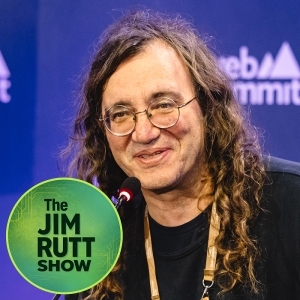Discover The Jim Rutt Show
The Jim Rutt Show

449 Episodes
Reverse
Jim talks with cognitive scientist and AI researcher Joscha Bach about the computational and representational foundations of consciousness, mind, and reality. They discuss the phenomenology of waking up and coalescing into a self, language as a representational architecture and natural language as "a genre of music," the brain as a game engine constructing a simulated world, the "feeling of realness" as a hallucination, "to be real means to be implemented" as a criterion for reality, money as an AI and a mechanism for reward allocation, the need for multi-dimensional organizational signaling beyond money, the apparent reversibility of the universe as an emergent observational artifact, the block universe and its incompatibility with stacked emergence, causality as a model property and retrocausality at the level of agents, computation vs. the simulation hypothesis, the brain's object engine and the perceptual choice to see textures vs. named objects, aphantasia and metacognition about perception, why only simulations can be conscious, Christof Koch's shift from physicalism to panpsychism and the unreliability of revelatory mental states, consciousness as second-order perception distinct from selfhood, panpsychism's resurgence and its failure to formalize "the consciousness of a particle," consciousness as happening at neuronal communication speeds, intelligence vs. consciousness as relatively orthogonal dimensions, the Waymo as highly intelligent but not conscious, François Chollet's argument that deploying skills is not itself intelligent, consciousness as a consensus algorithm analogous to blockchain, whether a bacterium or a cat needs a self-model to achieve coherence, emotion and motivation as core to cognition in MicroPsi, Karl Friston's free energy principle and its limits at higher emergent levels, humans as "multicellular at the next level" forming transcendental agents, the global optimum of collectively enacted agency as "God" as the ultimate source of meaning, and much more.
Episode Transcript
California Institute for Machine Consciousness (CIMC)
Principles of Synthetic Intelligence, by Joscha Bach
JRS EP 72 - Joscha Bach on Minds, Machines & Magic
JRS EP 87: Joscha Bach on Theories of Consciousness -
JRS EP Currents 83: Joscha Bach on Synthetic Intelligence
Joscha Bach is a cognitive scientist and AI researcher, and the founder of the California Institute for Machine Consciousness. In the past, he researched and taught at Humboldt University of Berlin, the Institute of Cognitive Science in Osnabrück, MIT Media Lab, the Harvard Program for Evolutionary Dynamics and Intel Labs. He has helped build several startups and created the cognitive architecture MicroPsi, which studies the relationship between emotion, motivation and cognition. He currently lives in the Bay area in California.
In this Worldviews episode, Jim talks with Iain McGilchrist about consciousness, matter, and the nature of reality. They discuss consciousness as the basis of everything we know, matter as a phase of consciousness that provides resistance and persistence, pan-experientialism and the belief that everything in the cosmos experiences in some form, the whirlpool metaphor for individual consciousness within a broader field, emergent naturalism and nested levels of organization, the question of whether the universe is continuous or granular at the Planck scale, consciousness in animals including chimps and corvids, language as the principal difference between human and animal consciousness, John Vervaeke's distinction between propositional and participatory knowing, the divided brain and how the left and right hemispheres attend to the world differently, the left hemisphere's focus on decontextualized abstractions versus the right hemisphere's grasp of interconnected wholes, how the left hemisphere deals with representations while the right hemisphere experiences presences, living in a world dominated by the relatively stupid left hemisphere, the relationship between consciousness and reality as an encounter rather than naive realism or idealism, relations coming before things, Lee Smolin's argument that time cannot be an illusion, assembly theory's challenge to the block universe, values as ontological primitives that cannot be derived from a valueless cosmos, the distinction between value and values, teleology as a lure rather than determinism using Waddington's creodes metaphor, the three elements of a fulfilled life (belonging to a coherent social group, belonging in nature, and belonging in the cosmos), the breakdown of collective sense making despite increased education levels, the decline in the caliber of political leaders, the distinction between information and wisdom, and much more.
Episode Transcript
The Master and His Emissary, by Iain McGilchrist
The Matter with Things, by Iain McGilchrist
JRS EP 154 - Iain McGilchrist on The Matter With Things
JRS EP 155 Iain McGilchrist Part 2: The Matter With Things
The Emergence of Everything, by Harold Morowitz
Time Reborn, by Lee Smolin
JRS EP 5 Lee Smolin - Quantum Foundations and Einstein’s Unfinished Revolution
Iain McGilchrist is a former Fellow of All Souls College, Oxford, an associate Fellow of Green Templeton College, Oxford, a Fellow of the Royal College of Psychiatrists, a Fellow of the Royal Society of Arts, a Consultant Emeritus of the Bethlem and Maudsley Hospital, London, a former research Fellow in Neuroimaging at Johns Hopkins University Medical School, Baltimore, and a former Fellow of the Institute of Advanced Studies in Stellenbosch. He now lives on the Isle of Skye, off the coast of North West Scotland, where he continues to write, and lectures worldwide. He is committed to the idea that the mind and brain can be understood only by seeing them in the broadest possible context, that of the whole of our physical and spiritual existence, and of the wider human culture in which they arise – the culture which helps to mould, and in turn is moulded by, our minds and brains.
In a special edition of the new Worldviews series, Brendan Graham Dempsey asks Jim about his life and worldview using a faith development interview. They discuss Jim's life chapters from growing up through becoming a complexity guy and GameB advocate, his age 11 epiphany that religion is bullshit after researching world religions at the library, the formative influence of his wife and parents who built lives from poverty, his realization that exponential growth on a finite planet driven by advertising and economic systems is destructive, understanding the limits of knowledge through complexity science and rejecting naive Newtonianism, his three core values of human well-being, ecological richness, and preserving humanity's path to bring the universe to life, the belief that humans may be the only general intelligence in the universe, the sacred as high-dimensional experiences that can't be explained scientifically, the importance of humility given how often we're wrong, the decision-making method of studying enough for a bullshitter's understanding then walking until reaching a conclusion, utilitarian deontology, human life as a leaf node on the tree of emergence, language and science as major transitions with AI as a potential third, disbelief in the supernatural, explaining evil through game theory, psychopathy as evil by nature, humans as mesoscale entities, a universe fine-tuned for emergence, and much more.
Episode Transcript
Institute of Applied Metatheory
A God That Could be Real: Spirituality, Science, and the Future of Our Planet, by Nancy Ellen Abrams
Brendan Graham Dempsey is Director of Research at the Institute of Applied Metatheory, where he studies the complexification of worldviews and human meaning-making systems across scales. He holds an advanced degree from Yale University, where he studied religion and culture. His books include Emergentism: A Religion of Complexity for the Metamodern World and the multi-volume Evolution of Meaning series. He is Managing Editor of Integration: The Journal of Big Picture Theory and Practice and a founding editor of Metamodern Theory & Praxis.
Jim talks with Michael Shermer about his worldview and his new book, Truth: What It Is, How to Find It, and Why It Still Matters. They discuss Michael's self-identification as a monist and realist who believes in a physical objective world, the concept of fallibilism, intersubjective verification of the interobjective, reliance on authorities and institutions, the battle between the book of authority versus the book of nature, balancing rationality with empiricism, the dependence of mathematical truths on axioms, January 6 as an example of people acting rationally on false beliefs, Shermer's journey from born-again Christian to atheist and Jim's opposite journey from Catholicism to atheism, treating religious literature like great literature with deeper truths, the study of consciousness and the hard problem versus the easy problem, separating intelligence from consciousness, consciousness as a biological process like digestion, the question of machine sentience, a critique of Donald Hoffman's interface theory, evidence for veridical perception through mimicry in nature and animals climbing trees, skepticism about brain-in-a-vat and simulation scenarios, minimum viable metaphysics, Thomas Nagel's concept of one thought too many, Jonathan Rauch's constitution of knowledge, the replication crisis in psychology, the breakdown of trust in institutions due to COVID and the noble lie, the problem of scaling laws with followership, moral realism and the survival and flourishing of sentient beings, the principle of interchangeable perspectives, discovering moral values through problem-solving, the evolution of ethics and the expanding moral sphere, and much more.
Episode Transcript
Truth: What It Is, How to Find It, and Why It Still Matters, by Michael Shermer
The Michael Shermer Show
Why People Believe Weird Things, by Michael Shermer
The Believing Brain, by Michael Shermer
Why Darwin Matters, by Michael Shermer
The Science of Good and Evil, by Michael Shermer
Conspiracy: Why the Rational Believe the Irrational, by Michael Shermer
"A Minimum Viable Metaphysics," by Jim Rutt
JRS EP 287 - Jonathan Rauch on the Epistemic Crisis
Dr. Michael Shermer is the Founding Publisher of Skeptic magazine and the host of the podcast The Michael Shermer Show. For 30 years he taught college and university courses in critical thinking, and for 18 years he was a monthly columnist for Scientific American. He is the author of New York Times bestsellers Why People Believe Weird Things and The Believing Brain, Why Darwin Matters, The Science of Good and Evil, The Moral Arc, Heavens on Earth, Giving the Devil His Due, and Conspiracy: Why the Rational Believe the Irrational. His new book is Truth: What it is, How to Find it, Why it Still Matters. Follow him on X @michaelshermer.
Jim talks with Ben Goertzel about his worldview. They discuss Ben's morning experience of consciousness crystallizing from ambient awareness, his identification as a panpsychic, the concept of pattern being more fundamental than stuff, Charles Peirce's ontology of first/second/third, the idea of uryphysics as a broader notion of physics beyond metaphysics, parapsychology and psi phenomena including remote viewing and Project Stargate, reincarnation-like phenomena and cases from India, experimental design in parapsychology research, the legitimation of both AGI and psi research, the consciousness explosion occurring alongside AI/ASI development, Jeffrey Martin's work on fundamental well-being and persistent nonsymbolic experience, the immense design space of possible minds, human cognitive limitations like seven plus or minus two short-term memory, the single-threaded nature of human consciousness versus potential multi-threaded ASI, scenarios for beneficial superintelligence and options for humans to remain in human form or upload, the question of how long human existence would remain interesting post-singularity, psychedelics as tools for accessing different states of consciousness and insights into mind construction, the absence of shamanic institutions in modern culture, experiences with DMT and heroic doses, holding multiple contradictory perspectives simultaneously, Walt Whitman's notion of containing multitudes, Ben's intuitive sense that consciousness and the basic ground of being are fundamentally joyful and compassionate, arguments for why superintelligence will likely be good based on efficiency of mutually trusting agents, and much more.
Episode Transcript
The Consciousness Explosion, by Ben Goertzel
JRS EP 217 Ben Goertzel on a New Framework for AGI
JRS EP 211 Ben Goertzel on Generative AI vs. AGI
JRS Currents 072: Ben Goertzel on Viable Paths to True AGI
Evidence for Psi: Thirteen Empirical Research Reports, ed. Damien Broderick & Ben Goertzel
Dr. Ben Goertzel is a cross-disciplinary scientist, entrepreneur and author. Born in Brazil to American parents, in 2020 after a long stretch living in Hong Kong he relocated his primary base of operations to a rural island near Seattle. He leads the SingularityNET Foundation, the OpenCog Foundation, and the AGI Society which runs the annual Artificial General Intelligence conference. Dr. Goertzel’s research work encompasses multiple areas including artificial general intelligence, natural language processing, cognitive science, machine learning, computational finance, bioinformatics, virtual worlds, gaming, parapsychology, theoretical physics and more.
In the inaugural episode of a new series, Jim talks with David Krakauer about his intellectual formation and worldview. They discuss what woke up as David this morning, his commitments to chance and pattern seeking, his epiphany about the idea of the idea at age 12 or 13, his perverse attraction to the arcane and difficult, evolution as integral to intelligence, the risk-averse character of scholars and the sociology of science, the Santa Fe Institute's attempt to maintain revolutionary science, the Ouroboros concept challenging foundationalism in epistemology, the standard model of physics as foundational versus the view that you can establish foundations anywhere, string theory as a slowly dying pseudoscience, whether beauty is a useful guide in science, emergence and broken symmetries, Phil Anderson's "More is Different" paper, the Wigner reversal and the shift from law to initial conditions, rejecting both weak and strong emergence, effective theories and causally justified concepts, downward causality, micrograining versus coarse graining, the distinction between abiotic and biotic systems, games and puzzles as model systems for complexity, combinatorial solution spaces, heuristics as dimensional reducers and potentially the golden road to AGI, Isaiah Berlin's influence on David's worldview, negative versus positive liberties, value pluralism and historicity, the Fermi paradox and the possibility of alien life, the rational versus the irrational in human life, and much more.
Episode Transcript
JRS EP 192 - David Krakauer on Science, Complexity and AI
JRS EP10 - David Krakauer: Complexity Science
The Complex World: An Introduction to the Foundations of Complexity Science, by David Krakauer
Worlds Hidden in Plain Sight: The Evolving Idea of Complexity at the Santa Fe Institute, 1984–2019, by David Krakauer
History, Big History, & Metahistory, by David Krakauer
"A Minimum Viable Metaphysics," by Jim Rutt
"More Is Different," by P.W. Anderson
The Emergence of Everything, by Harold Morowitz
David Krakauer’s research explores the evolution of intelligence and stupidity on Earth. This includes studying the evolution of genetic, neural, linguistic, social, and cultural mechanisms supporting memory and information processing, and exploring their shared properties. President of the Santa Fe Institute since 2015, he served previously as the founding director of the Wisconsin Institutes for Discovery, the co-director of the Center for Complexity and Collective Computation, and professor of mathematical genetics, all at the University of Wisconsin, Madison.
In this flipped episode, Brendan Graham Dempsey interviews Jim about the ideas in his recent Substack essays "A Minimum Viable Metaphysics" and "What I Mean by 'Metaphysics'." They discuss metaphysics as assumptions for learning and reasoning, the difference between deduction, induction, & abduction, Jim's belief that there are no paradoxes in the real world, the reality principle, the asymmetry principle, the lawfulness principle, the potential stochastic nature of reality, why determinism and lawfulness aren't the same, consciousness in the tree of emergence, why emergence is important, causal time, downward causality as the main claim of emergence, temporal reciprocal emergence, Jim's reputation for drawing a firearm when the word metaphysics is used, the weak & strong anthropic principles, and much more.
Episode Transcript
"A Minimum Viable Metaphysics," by Jim Rutt
"What I Mean by 'Metaphysics'," by Jim Rutt
JRS EP 322 - Brendan Graham Dempsey on Psyche and Symbolic Learning
Institute of Applied Metatheory
The Beginning of Infinity: Explanations That Transform the World, by David Deutsch
JRS Currents 100: Sara Walker and Lee Cronin on Time as an Object
Brendan Graham Dempsey is Director of Research at the Institute of Applied Metatheory, where he studies the complexification of worldviews and human meaning-making systems across scales. He holds an advanced degree from Yale University, where he studied religion and culture. His books include Emergentism: A Religion of Complexity for the Metamodern World and the multi-volume Evolution of Meaning series. He is Managing Editor of Integration: The Journal of Big Picture Theory and Practice and a founding editor of Metamodern Theory & Praxis.
Jim talks with Nate Soares about the ideas in his and Eliezer Yudkowsky's book If Anybody Builds It, Everyone Dies: Why Superhuman AI Would Kill Us All. They discuss the book's claim that mitigating existential AI risk should be a top global priority, the idea that LLMs are grown, the opacity of deep learning networks, the Golden Gate activation vector, whether our understanding of deep learning networks might improve enough to prevent catastrophe, goodness as a narrow target, the alignment problem, the problem of pointing minds, whether LLMs are just stochastic parrots, why predicting a corpus often requires more mental machinery than creating a corpus, depth & generalization of skills, wanting as an effective strategy, goal orientation, limitations of training goal pursuit, transient limitations of current AI, protein folding and AlphaFold, the riskiness of automating alignment research, the correlation between capability and more coherent drives, why the authors anchored their argument on transformers & LLMs, the inversion of Moravec's paradox, the geopolitical multipolar trap, making world leaders aware of the issues, a treaty to ban the race to superintelligence, the specific terms of the proposed treaty, a comparison with banning uranium enrichment, why Jim tentatively thinks this proposal is a mistake, a priesthood of the power supply, whether attention is a zero-sum game, and much more.
Episode Transcript
If Anybody Builds It, Everyone Dies: Why Superhuman AI Would Kill Us All, by Eliezer Yudkowsky and Nate Soares
"Psyop or Insanity or ...? Peter Thiel, the Antichrist, and Our Collapsing Epistemic Commons," by Jim Rutt
"On Targeted Manipulation and Deception when Optimizing LLMs for User Feedback," by Marcus Williams et al.
Attention Sinks and Compression Valleys in LLMs are Two Sides of the Same Coin," by Enrique Queipo-de-Llano et al.
JRS EP 217 - Ben Goertzel on a New Framework for AGI
"A Tentative Draft of a Treaty, With Annotations"
Nate Soares is the President of the Machine Intelligence Research Institute. He has been working in the field for over a decade, after previous experience at Microsoft and Google. Soares is the author of a large body of technical and semi-technical writing on AI alignment, including foundational work on value learning, decision theory, and power-seeking incentives in smarter-than-human AIs.
Jim talks with Alex Ebert about the ideas in his Substack essay "New Age and the Religion of Self: The Anatomy of a Rebellion Against Reality." They discuss the meanings of New Age and religion, the New Thought movement, the law of attraction, manifesting, Trump's artifacts of manifestation, the unmooring from concrete artifacts, individual and collective hallucinations, intersubjective verification of the interobjective, the subjective-first perspective, epistemic asymmetry as the cool, New Ageism's constant reference to quantum physics, manifesting as a way to negate social responsibility, the odd coincidence of leaving the gold standard and New Ageism, spiritual bypassing, a global derealization, new retribalized collective delusions, the Faustian bargain of AI, rationality as a virus, the noble lie, indeterminacy as a sign of emergence, nostalgia as a sales pitch, regaining the sense of hypocrisy, localized retribalizations, GameB as a series of membranes, and much more.
Episode Transcript
"New Age and the Religion of Self: The Anatomy of a Rebellion Against Reality," by Alex Ebert
Bad Guru (Alex's Substack)
Jim Rutt's Substack
"Unclear Thinking About Philosophical Zombies and Quantum Measurement," by Jim Rutt
The Century of the Self (documentary by Adam Curtis)
Alex Ebert is a platinum-selling musician (Edward Sharpe and The Magnetic Zeros), Golden Globe-winning film composer, cultural critic and philosopher living in New Orleans. His philosophical project, FreQ Theory, as well as his cultural analyses, can be followed on his Substack.
Jim talks with Joe Edelman about the ideas in the Meaning Alignment Institute's recent paper "Full Stack Alignment: Co-Aligning AI and Institutions with Thick Models of Value." They discuss pluralism as a core principle in designing social systems, the informational basis for alignment, how preferential models fail to capture what people truly care about, the limitations of markets and voting as preference-based systems, critiques of text-based approaches in LLMs, thick models of value, values as attentional policies, AI assistants as potential vectors for manipulation, the need for reputation systems and factual grounding, the "super negotiator" project for better contract negotiation, multipolar traps, moral graph elicitation, starting with membranes, Moloch-free zones, unintended consequences and lessons from early Internet optimism, concentration of power as a key danger, co-optation risks, and much more.
Episode Transcript
"A Minimum Viable Metaphysics," by Jim Rutt (Substack)
Jim's Substack
JRS Currents 080: Joe Edelman and Ellie Hain on Rebuilding Meaning
Meaning Alignment Institute
If Anyone Builds It, Everyone Dies: Why Superhuman AI Would Kill Us All, by Eliezer Yudkowsky and Nate Soares
"Full Stack Alignment: Co-aligning AI and Institutions with Thick Models of Value," by Joe Edelman et al.
"What Are Human Values and How Do We Align AI to Them?" by Oliver Klingefjord, Ryan Lowe, and Joe Edelman
Joe Edelman has spent much of his life trying to understand how ML systems and markets could change, retaining their many benefits but avoiding their characteristic problems: of atomization, and of servicing shallow desires over deeper needs. Along the way this led him to formulate theories of human meaning and values (https://arxiv.org/abs/2404.10636) and study models of societal transformation (https://www.full-stack-alignment.ai/paper) as well as inventing the meaning-based metrics used at CouchSurfing, Facebook, and Apple, co-founding the Center for Humane Technology and the Meaning Alignment Institute, and inventing new democratic systems (https://arxiv.org/abs/2404.10636). He’s currently one of the PIs leading the Full-Stack Alignment program at the Meaning Alignment Institute, with a network of more than 50 researchers at universities and corporate labs working on these issues.
Jim talks with John Preston about his book 40 Flushes to Grow Your Business: The World's #2 Business Series, which is designed to be read during bathroom breaks. They discuss breaking free from being a one-person show, hiring self-guided employees, the importance of business owner support networks, clarity on business goals & personal objectives, the five-gear growth machine business metrics model, marketing fundamentals & investment levels, understanding the customer journey, social media pitfalls, customer inquiry response strategies, complaint management, CEO time management & delegation, working capital needs, lifestyle creep, measuring business metrics, gross profit vs net profit, building high-trust company cultures, transparency with employees, marketing strategies & customer acquisition, hiring & retention strategies, and much more.
Episode Transcript
40 Flushes to Grow Your Business: The World's #2 Business Series, by John Preston
Start with Why: How Great Leaders Inspire Everyone to Take Action, by Simon Sinek
The JP Business Academy
John Preston is a Hall of Fame sales and business coach who transforms complex concepts into actionable insights for entrepreneurs and sales teams, drawing from his 22+ years as a television news reporter and producer. As the creator of JP Business Academy, he specializes in making business education accessible through live, engaging training sessions and online teaching. He can be reached by email at john@thejpbusinessacademy.
Jim talks with Pablos Holman about the ideas in his new book Deep Future: Creating Technology That Matters. They discuss deep tech versus shallow tech, computational modeling and simulation for real-world problems, the hacker mindset, the role of inventors, nuclear power and renewable energy solutions, population growth, development challenges, space-based solar power, the likelihood of fusion power, mistakes in German energy policy, energy storage limitations, the transformation of the apparel industry through automation, and much more.
Episode Transcript
Deep Future: Creating Technology That Matters, by Pablos Holman
Deep Future (company)
Intellectual Ventures Lab
Pablos is a hacker, inventor, and bestselling author of Deep Future: Creating Technology that Matters, the indispensable guide to deep tech. Now Managing Partner at Deep Future, investing in technologies to solve the world’s biggest problems. Previously, Pablos worked on spaceships at Blue Origin and helped build The Intellectual Ventures Lab to invent a wide variety of breakthroughs including a brain surgery tool, a machine to suppress hurricanes, 3D food printers, and a laser that can shoot down mosquitos—part of an impact invention effort to eradicate malaria with Bill Gates. Pablos hosts the Deep Future Podcast and is a top public speaker—his talks have over 30 million views.
Jim talks with Brendan Graham Dempsey about the ideas in his book Psyche and Symbolic Learning, volume 2 in his Evolution of Meaning series. We discussed hierarchical complexity, stage theories of development, constructivism & realism, dynamic skill theory, the Lectical Scale, ego development & consciousness, meaning systems & worldviews, cross-cultural developmental patterns, statistical distributions of developmental stages, the relationship between semantic richness & structural complexity, justification systems theory & cultural evolution, and much more.
Episode Transcript
A Universal Learning Process, by Brendan Graham Dempsey (Volume 1)
Emergentism, by Brendan Graham Dempsey
In Over Our Heads, by Robert Kegan
"What Is It Like to Be a Bat?", by Thomas Nagel
EP 172 Brendan Graham Dempsey on Emergentism
EP 293 Brendan Graham Dempsey on Cosmic Teleology and Emergence Vectors
Brendan Graham Dempsey is a writer, researcher, organic farmer, and the director of Sky Meadow Institute, an organization dedicated to “promoting systems-based thinking about the things that matter most.” He graduated summa cum laude with a BA in religious studies and classical civilizations from the University of Vermont and earned his master’s from Yale University, where he studied religion and culture. He is the author of Metamodernism: Or, The Cultural Logic of Cultural Logics and host of the Metamodern Spirituality Podcast. His primary interests include theorizing developments in culture after postmodernism, productively bridging the divide between science and spirituality, and developing sustainable systems for life to flourish. All of these lead through the paradigms of emergence and complexity, which inform all of his work.
Jim talks with James Fadiman and Jordan Gruber about the findings in their recent book Microdosing for Health, Healing, and Enhanced Performance. They discuss the definition of microdosing, "subthreshold" vs "subperceptual," typical doses, current usage statistics & demographics, its legal status & classification history, LSD, psilocybin, why cannabis isn't suitable for microdosing, mechanisms of action, dosing protocols, anti-inflammatory effects, health applications, enhancement applications, contraindications & side effects, research methodologies & limitations, commercial potential, global adoption patterns, and much more.
Episode Transcript
Microdosing for Health, Healing, and Enhanced Performance, by James Fadiman and Jordan Gruber
The Psychedelic Explorer's Guide, by James Fadiman
Our Symphony of Selves, by James Fadiman and Jordan Gruber
JRS EP126 - Jordan Gruber & James Fadiman on Our Symphony of Selves
Autism on Acid, by Aaron Paul Orsini
Institute of Noetic Sciences
James Fadiman, Ph.D., is a prominent figure in the field of psychedelic research, particularly known for his work on microdosing psychedelics like LSD and psilocybin. Often called the “father of microdosing,” Fadiman has a long history in the study of psychedelics dating back to the 1960s, when he worked on studies involving LSD and creativity while at Stanford University. After psychedelics were banned in the U.S., Fadiman shifted his focus but returned to psychedelic research decades later. His book, The Psychedelic Explorer’s Guide: Safe, Therapeutic, and Sacred Journeys, has become a key resource for safe psychedelic exploration. In recent years, he has pioneered research on microdosing, examining its potential benefits for mental health, cognitive enhancement, and overall well-being.
Jordan Gruber, JD, MA, founded the early online Enlightenment.Com community. After practicing law at Cooley Godward and focusing on IP law at NASA’s Moffett Field, as well as working at GNOSIS Magazine, Jordan became “the Practical Wordsmith,” a writer, ghostwriter, editor, and writing coach speciliazing in transformational modalities and practices. Jordan has helped create cutting-edge works on everything from forensic audio and financial services to health, wellness, psychology, and spirituality. Recent editing credits include Cindy Lou Golin’s The Shadow Playbook (2023), Scott Rogers’s The Mindful Law Student (2022), and Lawrence Ford’s The Secrets of the Seasons (2020).
Jim talks with David Shapiro about how to use AI language models as research and writing tools. They discuss post-labor economics, the evolution of AI tools from GPT-2 through GPT-4, using AI as a learning companion vs. relying on it completely, David's AI tool stack, exploring new domains, using NotebookLM for document management & searching, AI writing and editing techniques, critique and perspectives through personas, the rapid adoption of AI tools across industries, understanding limitations, challenges for AI startups, and much more.
Episode Transcript
JRS EP 317 - David Shapiro on Post-Labor Economics
David Shapiro is an American AI thought leader, author, YouTuber, and former IT infrastructure and automation engineer based in Raleigh, North Carolina. With over 16 years of experience in technology, including four years focused on artificial intelligence, Shapiro has emerged as a prominent voice in AI philosophy, cognitive architectures, and post-labor economics. His work centers on the societal and economic implications of AI, advocating for a future of post-scarcity and hyper-abundance where automation meets basic human needs at low cost.
Jim talks with Lawrence Cahoone about his book The Orders of Nature and his systematic approach to naturalist philosophy. They discuss fallibilist & local metaphysics, objective relativism, the rejection of simples, Jim's materialism which grants emergence first-class existence, Wimsatt's notion of emergence & nonaggregativity, downward causation & pruning rules, natural complexes, Aristotle's four causes & the use of purpose in biology, the distinction between teleonomy & teleology, the five orders of nature (physical, material, biological, psychological & cultural), characteristic time scales in emergence theory, why particular disciplines coevolved in intellectual traditions, Erik Hoel's theory about emergence having the highest causal power, natural religion & the fine-tuned constants of the universe, the choice between multiverse explanations & a single ground of nature, Darwin's views on divine purpose, comparisons to deists like Spinoza & Einstein, and much more.
Episode Transcript
The Orders of Nature, by Lawrence Cahoone
The Emergence of Value: Human Norms in a Natural World, by Lawrence Cahoone
The Feynman Lectures on Physics, by Richard Feynman
Lawrence Cahoone graduated with a Ph.D. in Philosophy at Stony Brook University in 1985. Cahoone's areas of specialization are American Philosophy, Continental Philosophy, Social and Political Philosophy, Philosophy of Culture, Metaphysics and Natural Science and Modernism and Postmodernism. Since 2000, Cahoone has taught at Holy Cross and is now currently an Emeritus Professor of Philosophy at Holy Cross. He has also written and published seven books in his career, including The Emergence of Value, The Orders of Nature, and Cultural Revolutions.
Jim talks with Adam B. Levine about humanity's rapidly changing relationship with AI and "thinking on demand." They discuss the GPT-5 release & pricing, open-source AI models, the three-dimensional framework of AI advancement (models & hardware & agent frameworks), the evolution of vibe coding, development tools, agent-based development, AI implementation strategies with humans in the loop, the Midnight Protocol project, Vendor Relationship Management versus CRM, automated negotiation systems, the trillion-dollar opportunity in improving the infosphere, enshittification risks, local AI processing on personal devices, the future of AI agents as personal representatives, and much more.
Episode Transcript
Speaking of Bitcoin! Podcast
JRS EP 313 - Chris Colin on Why Customer Service Sucks
JRS EP 316 - Ken Stanley on the AI Representation Problem
The Intention Economy, by Doc Searls
Midnight Protocol
Adam B. Levine has spent over a decade pioneering disruptive technologies before they become mainstream. He launched one of the earliest Bitcoin podcasts, Let’s Talk Bitcoin! (2013), founded Tokenly (2014)—one of the earliest companies exploring what could be done with blockchain tokens—and served as CoinDesk’s first podcast editor (2019), hosting shows like Speaking of Bitcoin and Markets Daily. In 2021, he founded 330.ai, a startup building cutting-edge tools to boost creativity with AI.
Jim talks with David Shapiro about his six-part series on "post-labor economics." They discuss historical economic transitions, the logic of labor substitution, automation & AI's impacts on employment, the four basic human economic offerings (strength, dexterity, cognition & empathy), labor as a societal pillar, the pyramid of prosperity (universal basic services, collectively owned public & private assets, conventional private assets, & residual wages), the pyramid of power (immutable civic bedrock, freedom to transact, radical transparency, direct programmable democracy, & forkable constitutional meta-governance), blockchain & cryptocurrency, radical financial transparency, liquid democracy, governance innovation, and much more.
Episode Transcript
"Post-Labor Economics pt. 1: The Rise of Automation," by David Shapiro on Substack
"You should let the human race die out," by David Shapiro on Substack
Why Nations Fail, by Daron Acemoğlu and James Robinson
The Bitcoin Standard, by Saifedean Ammous
"An Introduction to Liquid Democracy," by Jim Rutt
David Shapiro is an American AI thought leader, author, YouTuber, and former IT infrastructure and automation engineer based in Raleigh, North Carolina. With over 16 years of experience in technology, including four years focused on artificial intelligence, Shapiro has emerged as a prominent voice in AI philosophy, cognitive architectures, and post-labor economics. His work centers on the societal and economic implications of AI, advocating for a future of post-scarcity and hyper-abundance where automation meets basic human needs at low cost.
Jim talks with Ken Stanley about the Fractured Entanglement Representation hypothesis in deep learning neural networks. They discuss open-endedness in AI systems & evolution, the Picbreeder experiment & its significance, the objective paradox of finding things by not looking for them, comparisons between Picbreeder & SGD networks, visual differences in internal representations, weight sweep experiments, modular vs tangled decomposition, implications for creativity & continual learning & generalization abilities, Unified Factored Representation as an alternative to FER, the relationship to grokking in neural networks, scaling considerations & evidence in larger models, potential methods to achieve UFR, connections to biological evolution and DNA representation, and much more.
Episode Transcript
Why Greatness Cannot Be Planned: The Myth of the Objective, by Kenneth Stanley and Joel Lehman
"Questioning Representational Optimism in Deep Learning: The Fractured Entanglement Representation Hypothesis" by Akarsh Kumar, Jeff Clune, Joel Lehman, and Kenneth Stanley
JRS EP137 - Ken Stanley on Neuroevolution
JRS EP130 - Ken Stanley on Why Greatness Cannot Be Planned
Kenneth O. Stanley is the Senior Vice President of Open-Endedness at Lila Sciences. He previously led a research team at OpenAI also on the challenge of open-endedness. Before that, he was Charles Millican Professor of Computer Science at the University of Central Florida and was also a co-founder of Geometric Intelligence Inc., which was acquired by Uber to create Uber AI Labs, where he was head of Core AI research. He is an inventor of popular algorithms including NEAT, novelty search, and CPPNs. He has won more than 10 best paper awards and his original 2002 paper on NEAT also received the 2017 ISAL Award for Outstanding Paper of the Decade 2002 - 2012 from the International Society for Artificial Life. He is also a coauthor of the popular science book, Why Greatness Cannot Be Planned: The Myth of the Objective (published originally in the US by Springer), and has spoken widely on its subject.
Jim talks with Ed Latimore about his new book Hard Lessons from the Hurt Business: Boxing and the Art of Life. They discuss Ed's chess playing & street hustling, size differences in modern heavyweight boxing, growing up in Pittsburgh's Hill District, childhood trauma & violence, his relationships with his single mother & absent father, middle school & gifted programs, the cocaine prank incident, his high school football career, academic struggles, attending University of Rochester, spending his father's life insurance money, his boxing career, the All American Heavyweights program, alcohol abuse, sobriety, Olympic trials, military service, a degree in physics, his current life as an author & speaker, and much more.
Episode Transcript
Hard Lessons from the Hurt Business: Boxing and the Art of Life, by Ed Latimore
"5 reasons why I quit boxing with only one loss," by Ed Latimore
"The book made me do it—why I'm boxing again," by Ed Latimore
Ed Latimore is a former professional heavyweight boxer, an amateur national champion, a competitive chess player, and a bestselling author with a B.A. in Physics from Duquesne University. He draws on his experiences in the boxing ring, in the classroom, and in recovery to teach people how to build grit and resilience.
























Hi! At this time, many have switched to online learning, but I don’t think this is a problem, on the contrary, this way you have more time for yourself. If you are still busy studying, you can always delegate some of the tasks to services like this https://myessayhelper.net/
excellent.
very interesting, but I stopped to listen, as the audio quality was so bad :-(